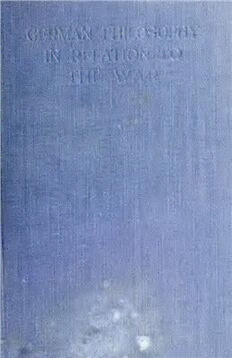
German Philosophy in the relation to the War (1915) PDF
Preview German Philosophy in the relation to the War (1915)
CORNELL UNIVERSITY LIBRARY The original of this book is in the Cornell University Library. There are no known copyright restrictions in the United States on the use of the text. http://www.archive.org/details/cu31924029021249 GERMAN PHILOSOPHY IN RELATION TO THE WAR GERMAN PHILOSOPHY RELATION TO IN WAR THE BY H. MUIRHEAD, LL.D. J. PROFESSOR OF PHILOSOPHY, UNIVERSITY OF BIRMINGHAM LONDON JOHN MURRAY, ALBEMARLE STREET, W. 1915 PREFACE It goes without saying that for the true under- standing of an event like a great war we have to search the depths of the mind of the nations concerned in it ; and, further, that in a country where, as Lange has said, " the apothecary cannot make up a prescription without being conscious of the relation of his activity to the constitution of the universe," we cannot stop short of the course of philosophical speculation that has prepared the way for it in the mind of the governing classes. But there is a special interest attachingto this question in the present case. Most people have a general idea of what is meant by " German Philosophy" most ; people, moreover, in this country believe that philosophical ideas have played a decisive part in recent events. But only those familiar with the history of modern thought are aware of the changes that have taken place in the course ofthe three generations that have passed PREFACE VI since the death of Hegel. There is thus a danger of doing grave injustice to what was in essence a great constructive effort of thought by associating it with the present orgy of violence and ruthless destruction. That the danger is a real one is proved by the fact that before the war was many weeks old letters appeared in The Times seeking to discredit the whole movement of German speculation and the higher criticism that to a large degree sprang out of it on precisely this ground. The confusion was pointed out by several writers (among others by myself) at the time. But the subject seemed to me important enough to deserve fuller treatment than was possible in the columns of The Times, and the lectures that follow were delivered in this University with that object. That I should be able to give an even passable account of anything so complicated as the movement of thought in Germany in the nineteenth century in so short a space, even though I had been competent to attempt it, was not of course to be expected. What I sought to do was, in the first place, to set the debt which philosophy, and through it civilization, owes to the series of great thinkers from Kant to Hegel in the simplest and clearest light secondly, to indicate some of ;
